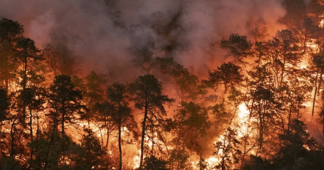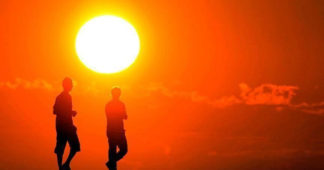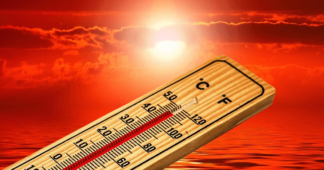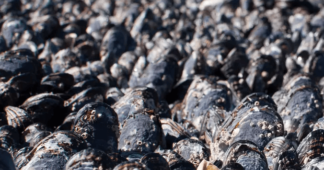By Thomas Scripps
Jul 19, 2022
Europe’s second heat wave this summer is setting record temperatures across the continent. Much of Southern and Western Europe will reach highs of 40-47°C (104-117°F). Thousands of people are dying, large swaths of land are burning, and harvests are being destroyed in what climate change is making an increasingly common and severe phenomenon.
Wildfires are raging across Portugal, Spain, France, Croatia, Greece and Turkey. A meteorologist described the southwest of France as an “apocalypse of heat,” and the French government has already been forced to evacuate 25,000 people, Turkey over 3,500 and Portugal over 800. Some 3,200 in southern Spain have been forced to flee what Spain’s ABC newspaper called “an avalanche of fire.”
Besides the destruction caused by fire, the heat wave is already producing a wave of heat deaths, usually by heart attack or stroke. Portugal has reported over 650 so far, with one person killed every 40 minutes between July 7 and 13. Spain has reported over 510. These numbers will soar. During the 2003 European heat wave, when temperatures reached high levels for a prolonged period, an estimated 72,000 people died across the continent, according to UN figures, including roughly 15,000 in France and 13,000 in Spain.
Compounding the danger, the vast majority of European households are not air conditioned. According to a survey by AC manufacturer Inaba Denko, 3 percent of homes in the UK and Germany have air conditioning, 5 percent in France, 7 percent in Italy, 8 percent in Portugal and 30 percent in Spain. In the UK, just 65 percent of office space and 30 percent of retail space have AC.
The response of the British government to this heat wave exemplifies the irresponsibility and reckless indifference to loss of life that characterise all of Europe’s governments. As global warming claims thousands of lives, threatens food supplies with devastating droughts and produces severe flooding, Deputy Prime Minister Dominic Raab cynically told the British people to “enjoy the heat” and to be “resilient.”
British Prime Minister Boris Johnson is infamous around the world for saying about the COVID-19 pandemic, “Let the bodies pile high in their thousands.” He did not even bother to attend an emergency cabinet meeting on Monday, after Britain declared its first-ever “red extreme heat warning.” The same day, rail services and airports shut down due to the effects of the heat, and hospital surgeries cancelled procedures because operating theatres were too hot to function.
Denouncing workers for wanting to shelter at home from COVID-19 and from the heat, the Daily Telegraph’s Associate Editor Camilla Tominey complained on Saturday: “Work-shy Britons have found a new reason to stay at home.”
This is a particularly stark example of the official indifference and inaction over climate change that have produced the current heat wave and drought.
After decades during which capitalist governments across the globe took no meaningful action on global warming, humanity is confronted with a catastrophe. Last November, the respected Climate Action Tracker forecast a 2.4°C rise in the world’s temperature by the end of the century based on the countries’ short-term emissions goals, well beyond the already dangerous limit of 1.5°C set by the 2015 Paris Agreement.
Extreme heat in Europe will rapidly become more common. A paper published this month in Nature Communications found that the continent had seen a “particularly strong increase in heat extremes,” with European heat waves “projected to increase disproportionately compared to the global mean temperature in the future.”
During last year’s wildfire season, Levent Kurmaz of Istanbul’s Bogazici University told the Independent: “It’s going to be a desert climate all around the Mediterranean by the end of the century.” By then, the Independent noted, “the climate in southern Turkey, southern Greece and southern Italy will be similar to that of Cairo and the southern Iraqi city of Basra now.”
Today, even as food prices rise sharply, crop harvests are in serious danger. Nearly half of Europe is at drought warning level and nearly a tenth at alert level. The European Drought Observatory has warned, “Water and heat stress are driving crop yields down from a previously already negative outlook for cereals and other crops. France, Romania, Spain, Portugal and Italy will need to deal with this reduced crop yield. Germany, Poland, Hungary, Slovenia and Croatia are also impacted.”
Northern Italy is suffering its worst drought in 70 years, with major rivers like the Po and the Serchio drying out almost completely. According to the country’s largest agricultural union, more than 30 percent of its agricultural production is threatened.
Another paper, published in Earth’s Future this March, found that the 2018-2020 European drought had been the worst in 250 years. Droughts as long as eight years could be expected in a medium case emissions scenario and 25 years in the worst case.
Rising ocean levels due to global warming threaten mass flooding and damage to crops and coastlines. Without enormous work on infrastructure to guard against flooding, the cost of flood damage would be massive. In 2014, the European Union (EU) estimated that this cost could rise by century’s end to 4 percent of Gross Domestic Product, or over a half-trillion dollars; in 2018, the Carbon Brief consortium estimated that cost at €961 billion.
Global warming is a critical threat requiring the planned, globally-coordinated mobilisation of humanity’s resources to avert disaster. Enormous technological, scientific and industrial resources must be dedicated to slashing carbon emissions, expanding public infrastructure, refitting billions of homes, and transforming world industry. This alone can protect lives, food supplies, and vital infrastructure and minimize the damage caused by climate change.
It has proven impossible to devise such a response within the bankrupt framework of the capitalist nation-state system, and under the diktat of the EU and the Johnson government, which are undisguised tools of the financial aristocracy and the City of London.
Instead, capitalist governments around the world are plunging trillions of dollars into building up their militaries and waging war with each other. Europe has increased its collective military spending by nearly $100 billion over the last decade, in the run-up to the outbreak of open war between US-NATO and Russia this year in Ukraine.
As they cut off natural gas imports from Russia, moreover, the NATO powers are even returning to heavily polluting energy sources: Germany, Austria and the Netherlands all restarted coal power stations. Under the authority of German Foreign Minister Annalena Baerbock of the Green Party, Germany’s climate envoy Jennifer Morgan told a recent climate conference in Berlin, “the Russian war of aggression is forcing us to take short-term decisions we don’t like.”
Workers and youth must draw the lessons of the inaction and murderous indifference of Europe’s capitalist governments. The struggle against global warming—like the struggle against war, and against the COVID-19 pandemic that has claimed nearly 1.9 million lives in Europe—is a political and class issue. The interests of workers and youth around the world are diametrically opposed to those of the ruling elite. The struggle against climate change requires the revolutionary mobilization of the working class in a struggle for socialism and a planned economy under the democratic control of the workers.
We remind our readers that publication of articles on our site does not mean that we agree with what is written. Our policy is to publish anything which we consider of interest, so as to assist our readers in forming their opinions. Sometimes we even publish articles with which we totally disagree, since we believe it is important for our readers to be informed on as wide a spectrum of views as possible.











